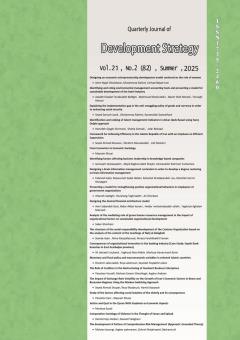Designing a brain information management curriculum in order to develop a degree centering on brain information management
Subject Areas : EducationalFatemeh Sati 1 , massomehalsadat abtahi 2 , Ruhollah Khoda bandelou 3 , Roohalla Karimikhoygani 4
1 - Faculty of Humanities, Azad University of Research Sciences, Tehran, Iran
2 - Scince and Research Branch,Islamic Azad Univercity,Tehran,Iran
3 - Assistant Professor, Faculty of Educational Technology, UPM University Malaysiaاستادیار، دانشکده تکنولوژی آموزشی ، دانشگاه یو پی ام مالزی، مالزی
4 -
Keywords: Curriculum, brain, information, information management, brain information management.,
Abstract :
In this research, the compilation and design of a brain information management curriculum was discussed with the foundational data theory method. Interviews were used to collect research data. The participants were 17 experts in this field. The analyzes revealed 67 codes or primary concepts. The goal of the curriculum (14 items), the logic and why of the curriculum (12 items) and techniques (11 items) had the highest number of concepts. The elements of the logic and reason of the curriculum include 1) achieving brain capacities, 2) diversity in the cognitive and functional brain system, 3) the role of information and how to process them, 4) interdisciplinary applications, 5) the special nature of information and 6) flexibility. It was the brain. The goals include 1) improving learning, 2) improving personal performance in daily life, 3) learning at a high speed, 4) improving the speed and quality of decision-making, 5) developing creativity, 6) mental agility, 7) learning accumulation, 8) health, 9) training specialists, 10) empowering control over information. The teaching method included 1) pen and paper, 2) self-study and intervention, 3) project teaching method, 4) group discussion, 5) problem solving, 6) comparison and contrast, 7) group cooperation and 8) games. The curriculum content included 1) information analysis, 2) processing reconstruction, 3) information pathogenesis, 4) information management, 5) infomorphology, 6) infotherapy, 7) brain function, 8) neuroscience. The techniques included 1) unconscious processing, 2) mental photography technique, 3) using natural brain functions, 4) active recall, 5) visual images, 6) small content, 7) interactive exercises. The appropriate evaluation and evaluation method for this course was the formative evaluation method.
• اسکندری, ح. (1387). برنامه درسی پنهان. تهران: انتشارات نشر نسیما.
• تلخابی، محمود، برنامه درسی مبتنی بر مغز، فصلنامه نوآوریهای آموزشی، شماره 26، سال هفتم، تابستان 1387.
• فتحی واجارگاه, ک. (1388). اصول و مفاهیم برنامه درسی. تهران: نشر بال.
• پیری, م. (1388). طراحی و اعتبار سنجی الگوی برنامهریزی درسی مدرسه محور. دانشگاه تربیت معلم تهران,
• سیفی, س., سالاری, ح., فرخی, ن. (1389). بررسی تأثیر آموزش یادگیری مغزمحور بر درک مطلب و سرعت یادگیری دانشآموزان سوم ابتدایی. نوآوریهای آموزشی, 9(2), 45-60.
• مدنی فرد، م. (1398). زبان، موسیقی و مغز. علوم اعصاب شفاي خاتم, 7(3).
• محمدی، ف (1399)اینفورمولوژی، شیراز، انتشارات فرامتن.
• محمدی، ف (1397)اینفوتراپی؛ اطلاعاتی که درمان میکند، شیراز، انتشارات فرامتن.
• محمدی، ف (1397)اینفوپاتولوژی؛ آسیب شناسی اطلاعات مغز، شیراز، انتشارات فرامتن.
• محمدی، ف (1394)نظریه حیات اطلاعاتی انسان، شیراز، انتشارات فرامتن.
• محمدی، ف (بی تا) اطلاعات بیماری زا، شیراز، انتشارات فرامتن.
• محمودی، م. (1396). تدوین و اعتباریابی چارچوب برنامه درسی آموزش اقتصاد مقاومتی برای دوره ابتدایی. دانشگاه یزد.
• مهرمحمدی، محمود و همکاران. (1388). برنامه درسی: نظرگاه ها، رویکردها و چشم اندازها. تهران: انتشارات سمت.
• ملکی، حسن، ۱۳۹۳، راهنمای عمل برنامهریزی درسی، انتشارات پيام اندیشه، ویراست دوم، ج ۱۸: تهران .
• نوری, ع. (1390). تدوین چارچوب مفهومی برنامه درسی سازگار با مغز. (دکترا), دانشگاه تربیت مدرس, تهران.
• جاودانی, م. (1393). ساخت و اعتباریابی مقیاس سنجش الگوی کیفی مدیریت فرآیندهای یاددهی-یادگیری در دوره ابتدایی. مجله علمی-پژوهشی پژوهشهای برنامه درسی, 4(2), 31-31.
• شمشیری, م. (1386). تعلیم و تربیت مغز محور » راهی به سوی بازاندیشی، بازنگری و بازسازی فرآیند یاددهی یادگیر، خلاصه مقالات سومین کنگرۀ نوروپسیکولوژی ایران, تهران.
Herman , N. (2005). The creative braine: Lake lure, Nc : The Ned Hermann Group.
Abreena, T. (2007). Brain –based learning theory: An onlion cors design model. (Doctoral Dissertation), Liberty university,
Zare, M., Seifi, M., & Faghih, A. (2019). The Effectiveness of Brain-Based Learning Model on Studying and Reading Speed. Interacción y perspectiva: Revista de Trabajo Social, 9(1), 107-130.


